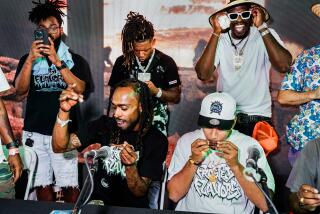Del Mar Fair Recalls Romantic Tales of Past
- Share via
When I was a boy, I had an Uncle Tommy.
He was tall and athletic and blond and always seemed to be telling an outrageous story. He was very romantic.
I can’t claim I think often of Uncle Tommy anymore, but I’m thinking of him now because the Del Mar Fair opens today.
As a young man he joined the carnival and for several seasons he played the fairs and festivals of California, Nevada and southern Oregon. He was a ride operator, and the Rock-o-Plane and the Tilt-a-Whirl were among his specialties.
He rode a Harley-Davidson. He picked up with a carnival woman named Audrey that the family disapproved of. He met the most fascinating Fellini-esque people.
One day he arrived at our house accompanied by a midget. That doesn’t sound like much now, but in the early 1950s a boy who had actually met a midget was an instant playground celebrity.
Later he introduced us to a fire-eater named Mullins. “You have to remember not to inhale,” said Mullins. I thought Mullins was hilarious.
Uncle Tommy loved the freedom and glitter of the carnival and he shared with us the secrets of the midway.
The operators who could give a ride an extra jiggle so your wallet fell out. The milk bottles at the baseball toss that could withstand a cannon shot without toppling. The barkers.
The pretty girls acting as shills by carrying large stuffed animals around the carnival grounds. Only the gullible thought those stuffed animals had been won at the “games of skill.”
The sense of menace and larceny only heightened the allure of the carnival. Second only to playing centerfield for the Yankees, being in the carnival seemed to me a joyous way of life.
Finally, Uncle Tommy left the carnival (and Audrey).
He was a cabdriver, geese rancher, lumberjack, golf course superintendent and a utility company “sandhog” digging trenches in downtown San Francisco. He even lived on an Indian reservation.
He never made any money but he never took any guff. He was big-hearted and irresponsible, qualities that I found immensely attractive as a boy.
Part of him never left the carnival. He used to talk to my father about building a super ride and rejoining the circuit.
It never happened but it pleased him to dream about it.
A year ago I told Roger Vitaich, the former Boy Scouts executive who is general manager of the Del Mar Fair, about Uncle Tommy. We were having a pleasant double Dos Equis lunch and I was trying to explain my familial connection to fair fever.
“Things have changed since Uncle Tommy’s time,” Vitaich assured me. No shills, no unwinnable games, no wallet collectors, no carnies on the lam.
More’s the pity, I thought. A world where the carnival is as scrubbed and earnest as a Lions Club fund-raiser is a world diminished.
Still, I’ll be at the fair tonight. There are plenty of things to see at the fair--the farm animals, the gems, the flowers, the kitchen gadgets, even boxing and wrestling--but to me a fair means a carnival midway.
By modern antiseptic standards, the Del Mar Fair is a good one.
Not as agri-funky as the old Yolo County Sugar Beet Festival or as exotic as the National Date Festival in Indio (it’s hard to top camel races and Queen Scheherazade) but good nevertheless. It’s not easy to design a fair for a county where the cash crop is real estate.
Most of the carnies are clean-cut and customer-friendly, like guides at Disneyland.
Occasionally you see a carny of old: deeply tanned, lean as a whippet, maybe a tattoo or two, mysterious and dangerous-looking, able to walk through the moving machinery of the rides without fear.
Maybe I’ll talk to one. Maybe I’ll ask him if he dreams of designing his own ride or if he knows a woman named Audrey.
More to Read
Sign up for Essential California
The most important California stories and recommendations in your inbox every morning.
You may occasionally receive promotional content from the Los Angeles Times.













